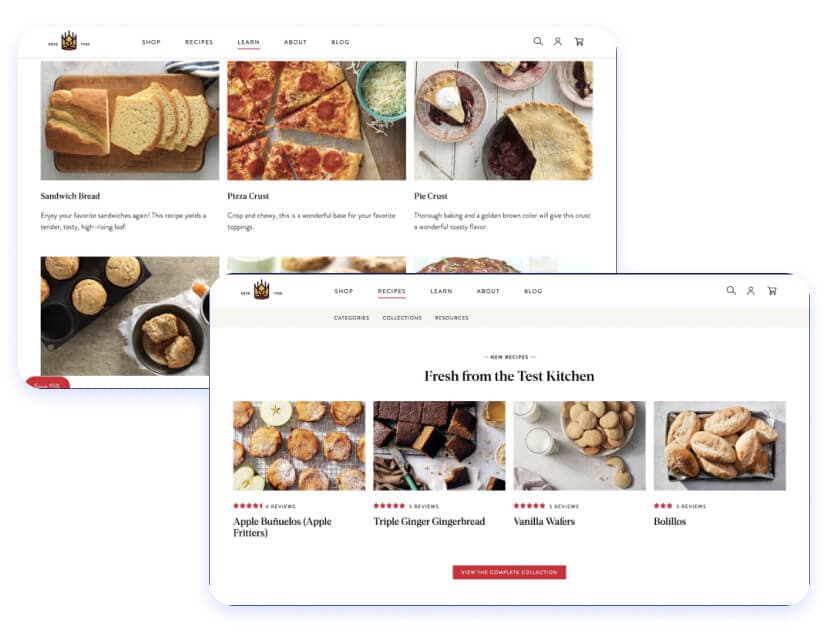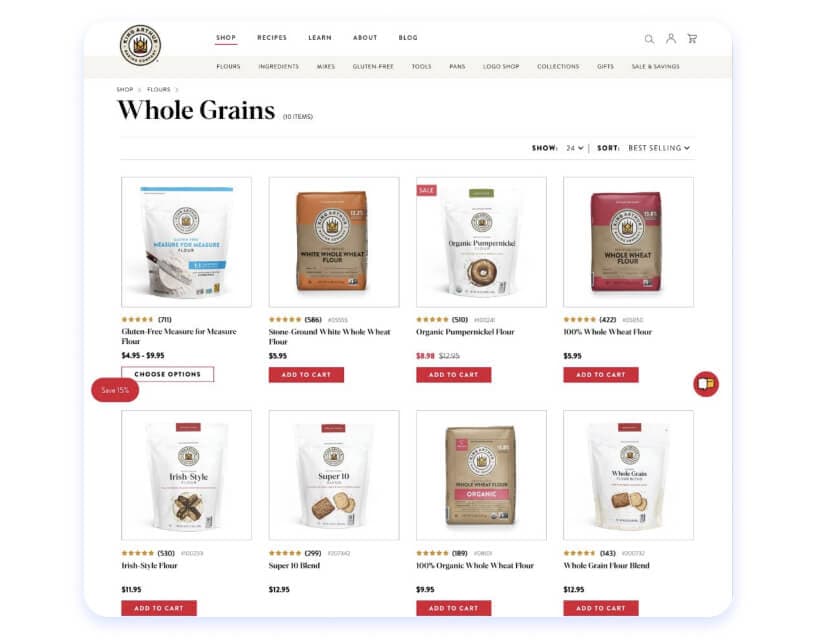Die Herausforderung
- Den Nutzern eine einfache Suche nach unterschiedlichen, vielfältigen Inhalten ermöglichen
- Den Kunden das Finden von relevanten Produkten zu erleichtern
- Ein positives und verbessertes Kundenerlebnis zu schaffen
King Arthur Baking Company hat eine Geschichte, die fast so geschichtsträchtig ist wie ihr legendärer Namensgeber. Gegründet im Jahr 1790 als erstes Mehlunternehmen in den frisch gegründeten Vereinigten Staaten als Henry Wood & Company, blieb es mehr als 200 Jahre lang in Familienbesitz.
1896 brachte das Unternehmen, damals noch Sands, Taylor & Wood Company, King Arthur Flour auf den Markt, um seine Stärke, Reinheit, seinen höheren Zweck und andere Arthur'sche Eigenschaften hervorzuheben. Nach 100 Jahren beschließen die Eigentümer Frank und Brinna Sands, das Unternehmen nach ihrer Verabschiedung in den Ruhestand an seine Mitarbeiter zu verkaufen. Im selben Jahr, am ersten Weihnachtsfeiertag, wurde die erste eigene Website veröffentlicht.
Seit 2004 wird das Unternehmen zu 100 Prozent von den Mitarbeitern geführt. „Das ist das Großartige und Einzigartige an unserem Unternehmen“, erklärt Mike Hoefer, Direktor für Webentwicklung, der für die Kundenwebsite seines Unternehmens verantwortlich ist.
, Ecommerce, Content Search
White River Jct. VT, USA
since 2019
, Dynamic Re-Ranking, Search API, A/B Testing, Analytics, Auto Synonyms, Merchandising Studio, Personalization
WICHTIGSTE ERGEBNISSE
EINGESETZTE TECHNOLOGIEN
Als ein Unternehmen, das sich im Besitz der Mitarbeiter befindet, erwerben die fast 400 Mitarbeiter Aktien des Unternehmens, die bei ihrer eigenen Pensionierung umgewandelt werden. Dies fördert eine Kultur, die sich dem Kundenerlebnis verschrieben hat und mit ihren begrenzten Ressourcen den gemeinsamen Erfolg kultiviert.
Der Grundsatz, ein „höheres Ziel“ zu verfolgen, ist nicht verloren gegangen. Im Jahr 2007 wurde das Unternehmen ein Gründungsmitglied von BCorp, einer Organisation, die gemeinnützige Unternehmen nach ihrer sozialen und ökologischen Leistung zertifiziert.
„Wir existieren also zum Nutzen unserer Kunden, unserer Mitarbeiter und des Planeten. Im Gegensatz zu einem traditionellen Unternehmen, das den Shareholder-Value über alles andere stellen muss, können wir als zertifizierte B-Corp einige andere Kennzahlen gleichberechtigt nebeneinander stellen“, sagt Hoefer.

Die Kunden von King Arthur Baking sind nicht nur Lebensmittelgeschäfte und Bäckereien, sondern auch eine große Zahl von Heimbäckern („Prosumenten“), die im Internet nach guten Ressourcen und Qualitätsprodukten suchen, „um ihre Backkünste auf die nächste Stufe zu bringen“, so Hoefer.
Das ist vielleicht der Grund, warum in den 25 Jahren seit dem Start der ersten Website die Anzahl der Rezepte, die Kunden finden können, von 13 auf über 2000 gestiegen ist. Außerdem findet man hier nun mehr als 1500 Blogbeiträge und 1000 Produkte.
„Wir haben eine Testküche mit Backexperten, die unsere Rezepte immer wieder neu entwickeln und testen, um sicherzustellen, dass sie auch in der heimischen Küche gelingen, dass die Anleitungen leicht zu befolgen sind und dass die Menschen mit ihren Backwerken Erfolg haben“, sagt er.
Die wichtigsten Kunden des Unternehmens sind die Lebensmittelläden, die das Mehl vertreiben. Wenn man die Menschen zum Backen ermutigt, werden sie auch zum Kauf angeregt. Mit einer positiven Web-Erfahrung erfüllt das Unternehmen seinen Auftrag, „die Freude am Backen mit der Welt zu teilen“.
Im Rahmen einer digitalen Transformation hat das Unternehmen seine Blogs, Rezepte, Marketing- und Unternehmensinhalte auf eine von Acquia gehostete Drupal-Plattform verlagert. Es wollte damit sein Content Management System (CMS) verbessern und eine bessere Benutzererfahrung sowie eine bessere Erfahrung für Entwickler und Management schaffen.
„Zuvor hatten wir eine Suchlösung, die auf E-Commerce ausgerichtet war, und wir haben versucht, Rezepte und Blogs in eine E-Commerce-Suchplattform zu zwängen“, sagt Hoefer.


Während des Projekts, eine neue Plattform zu entwickeln, entschied sich das Unternehmen, Optionen für die Suche zu erforschen, die ihm mehr Kontrolle über die Relevanz geben, „und nicht alles wie ein Produkt zu behandeln“.
Das Unternehmen analysierte die verschiedenen Optionen und entschied sich aufgrund der technischen Möglichkeiten, einschließlich der Suchgeschwindigkeit und der Benutzeroberfläche, für Algolia und nicht für Open-Source-Lösungen. Im Sommer 2019 ging das Unternehmen mit Algolia in den Live-Betrieb und fügte im vergangenen Jahr neue Inhalte zu den Suchindizes und Schnittstellen hinzu. Dank der einfachen Arbeit mit der Algolia-API und der Unterstützung durch das professionelle Serviceteam von Algolia konnte diese Aufgabe intern erledigt werden.
„Wir haben jetzt die volle Kontrolle über das Aussehen und die Wirkung unserer Suchergebnisse. Mit unserem vorherigen Tool waren wir wirklich darauf beschränkt, innerhalb bestimmter Grenzen zu arbeiten und konnten die Entwicklung nicht selbst vornehmen ... Bei der Entwicklung der Schnittstelle waren wir auf andere angewiesen.“ -
Mike Hoefer, Direktor für Webentwicklung, King Arthur Baking Company
Algolia ist auf der gesamten Website implementiert, sowohl in der Kopfzeile als auch, seit Kurzem, in den modalen Funktionen, die es ermöglichen, eine Suche nach Rezepten, Produkten und Blogs zu präsentieren.
Der Wechsel zu Algolia und die iterativen Verbesserungen haben laut Hoefer seinen Kunden ein schnelleres und einfacheres Sucherlebnis beschert und ihnen geholfen, neue Inhalte zu entdecken – so etwa die Präsentation von bisher nicht verfügbaren Videos und Backanleitungen.
„Die Suchfunktion ist eine etwas andere Herausforderung, wenn Sie Blogbeiträge, Rezepte, E-Commerce, Videos und Seiten mit Allergenangaben anbieten.
Die Herausforderung besteht darin, dies auf eine Weise zu präsentieren, die für unsere Kunden intuitiv und leicht verständlich ist.“ Durch die Zusammenarbeit von Algolia und Acquia kann King Arthur Baking seine Anforderungen an die Suche, das Web-Publishing und die Kommunikation erfüllen. Dies gilt sowohl heute als auch in Zukunft, für die das Unternehmen neue Pläne entwickelt.
Die beiden Plattformen ermöglichen es uns wirklich, das zu tun, was wir tun möchten, und das mit erstklassiger Technologie. Und wir können uns sicher sein, dass wir mit den Tools und Werkzeugen, die beide zur Verfügung stellen, immer weiter wachsen und unsere Kundenerfahrung online verbessern können.“
„Wir haben nun die Kontrolle über das Erscheinungsbild der Suchergebnisse und für ein Unternehmen wie das unsere, in dem wir viel Wert auf das Erscheinungsbild der Website legen, ist es wichtig, dass die Benutzererfahrung in den verschiedenen Bereichen der Website so konsistent wie möglich ist. Das war uns sehr wichtig.“
- Mike Hoefer, Direktor für Webentwicklung, King Arthur Baking Company
In der zweiten Phase der digitalen Transformation hat das Unternehmen vor kurzem seine E-Commerce-Website auf der BigCommerce-Plattform überarbeitet, und Hoefer sagt, dass die Flexibilität und der API-basierte Ansatz von Algolia dabei sehr hilfreich waren.
„Durch die Abkopplung oder Trennung der Suche von der Anwendung selbst haben wir eine gewisse Flexibilität, um Dinge mit unseren Plattformen zu tun, die wir sonst vielleicht nicht tun würden. Das heißt, wenn wir uns entscheiden, unser CMS zu ändern, können wir das tun, ohne die Suche zu beeinträchtigen. Auch wenn wir uns dazu entscheiden, unsere E-Commerce-Plattform zu ändern, können wir das tun, ohne die Suche zu beeinträchtigen.“ – Mike Hoefer, Leiter der Webentwicklung, King Arthur Baking Company.
Das Unternehmen hat das dynamische KI-basierte Re-Ranking von Algolia während der Urlaubssaison 2021 eingeführt. Die Annahme dieser Funktion war „eine sehr einfache Entscheidung“, meint Hoefer.

Wir sahen uns einfach die Vorschläge an, die das Programm in Bezug auf die Beliebtheit der Produkte auf einer Ergebnisseite machte, und es förderte die Produkte, die mehr Klicks bekamen oder für uns preiswerter waren, die bei unseren Kunden beliebter waren. Das hat uns wirklich geholfen, sicherzustellen, dass die Suche für unsere Kunden wirklich relevant ist, wenn sie während unserer geschäftigen Urlaubszeit suchen.“
Letztendlich ist es gleichgültig, ob es sich um E-Commerce-, Marketing- oder Unternehmensinhalte handelt, laut Hoefer kann er mit Algolia die von den Benutzern angezeigten Inhalte so unterstützen, „wie sie unterstützt werden sollen – ohne sie in eine bestimmte Größe oder Form zwingen zu müssen“.
Die Ergebnisse sind bemerkenswert. Innerhalb der ersten sechs Monate nach der Einführung von Algolia verbesserten sich die Konversionsraten für Sitzungen um 18% gegenüber dem Vorjahreszeitraum.
Für King Arthur Baking liegt der Erfolg darin, dass die Besucher ihrer Website Freude am Backen finden. Und genau dabei unterstützt Algolia sie, indem es großartige Rezepte, Videos, Blogs und Inhalte speziell für ihre Bedürfnisse bereitstellt. „Wir möchten unseren Besuchern unerwartete, aber relevante Inhalte bieten, um sie zum Backen zu inspirieren und ihnen die Inhalte an die Hand zu geben, mit denen sie dabei erfolgreich sein können“, so Hoefer. Er freut sich, wenn Kunden für eine bestimmte Sache auf die Website kommen und erfahren, dass es noch andere verwandte (oder nicht verwandte) Optionen gibt, die sie erkunden können. Er verweist auf die automatische Synonymfunktion von Algolia, die sich ebenfalls als äußerst nützlich erwiesen hat. „Wir nennen es vielleicht ‚Fladenbrot‘, aber sie nennen es vielleicht ganz anders: Vielleicht suchen sie nach einem ‚Pita‘-Rezept.“ Hoefer ergänzt, dass neben dem Inhalt auch die automatische Synonymfunktion den Kunden hilft, das richtige Produkt zu finden. „Wir nennen unsere Gärkörbe ‚Brotform‘, aber durch das Tool haben wir festgestellt, dass viele Kunden nach ‚Banneton‘ suchen. Das Synonym konnten wir mit einem schnellen Klick zu unserer Konfiguration hinzufügen.“
„Das Tool für automatische Synonyme ermöglicht es uns, die Suchbegriffe zu ermitteln, die unsere Kunden bei der Suche nach Produkten verwenden, und sicherzustellen, dass wir ihnen die relevanten Ergebnisse liefern.“ Hoefer sagt, dass er sich mit der Möglichkeit befasst, Algolia Recommend in Zukunft zu implementieren, da er einen guten Anwendungsfall dafür sieht.
In Zukunft beabsichtigt Hoefer, die Suchfunktion auf die Online-Backkurse seines Unternehmens auszudehnen, die derzeit bei der Suche nicht angezeigt werden können. „Wenn man nach ‚Scones‘ oder ‚Kuchen‘ sucht, wird man nicht nur auf Rezepte, Produkte und Blogs stoßen, sondern auch auf Kurse, die sich mit dem Backen von Kuchen beschäftigen.“
Powered by Algolia AI Recommendations